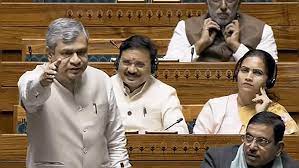Telecommunications Bill 2023 : Introduced In Lok Sabha

The government introduced the Telecommunications Bill 2023 in the Lok Sabha.
- It seeks to repeal the Indian Telegraph Act, 1885, the Indian Wireless Telegraphy Act, 1933, and the Telegraph Wires (Unlawful Possession) Act, 1950.
- It also amends the Telecom Regulatory Authority of India (TRAI) Act, 1997.
Key Provisions of Telecommunications Bill 2023:
- Prior authorisation from the central government will be required to provide telecommunication services, establish, operate, maintain, or expand telecommunications networks, or possess radio equipment.
- Existing licenses will continue to be valid for the period of their grant, or for five years, where the period is not specified.
- Spectrum will be assigned by auction, except for specified uses, where it will be allocated on an administrative basis.
- These include purposes such as national security and defense, disaster management, weather forecasting, transport, satellite services such as DTH and satellite telephony, and BSNL, MTNL, and public broadcasting services.
- The Bill introduces provisions for allocating spectrum to satellite Internet providers like OneWeb (supported by Bharti) and U.S.-based companies such as SpaceX’s Starlink.
- Presently, active authorizations have been granted to OneWeb and Jio, paving the way for satellite-based Internet services.
- Messages or a class of messages between two or more persons may be intercepted, monitored, or blocked on certain grounds.
- The government may take temporary possession of any telecom infrastructure, network, or services on occurrence of any public emergency or public safety.
- An officer authorized by the government may search premises or vehicles for possession of unauthorized telecom networks or equipment.
- The central government may prescribe standards and assessments for telecom equipment, infrastructure, networks, and services.
- Facility providers may seek a right of way over public or private property to establish telecom infrastructure.
- Right of way must be provided on a non-discriminatory and non-exclusive basis to the extent possible.
- The central government may provide for measures to protect users which include: prior consent to receive specified messages such as advertising messages, creation of Do Not Disturb registers, and a mechanism to allow users to report malware or specified messages.
- Biometric Authentication is mandatory for telecom customers to combat spam calls and messages.
- The Bill amends the TRAI Act to also allow individuals with: at least 30 years of professional experience to serve as the chairperson, and at least 25 years of professional experience to serve as members.
- The Universal Service Obligation Fund has been established under the 1885 Act to provide for telecom services in underserved areas.
- The Bill retains this provision, renames the fund as Digital Bharat Nidhi, and also allows its use for research and development.
- It has removed over-the-top (OTT) services and apps from the definition of telecommunication services, in a big relief to communication service providers such as WhatsApp and Telegram.
- The Ministry of Electronics and IT will handle the regulation of OTT apps under the potential Digital India Act, not included in the Telecom Bill.
- The Bill specifies various criminal and civil offenses. Providing telecom services without authorisation, or gaining unauthorized access to a telecom network or data, are punishable with imprisonment up to three years, a fine up to two crore rupees, or both.
- Breaching terms and conditions of authorisation is punishable with a civil penalty up to five crore rupees.
- The central government will appoint an adjudicating officer to conduct inquiries and pass orders against civil offenses under the Bill.
- The officer must be of the rank of joint secretary and above.
- A measure initially established post the India-China border conflict in 2020 to prevent the importation of telecom equipment from potentially adversarial nations is now integrated into the law.




